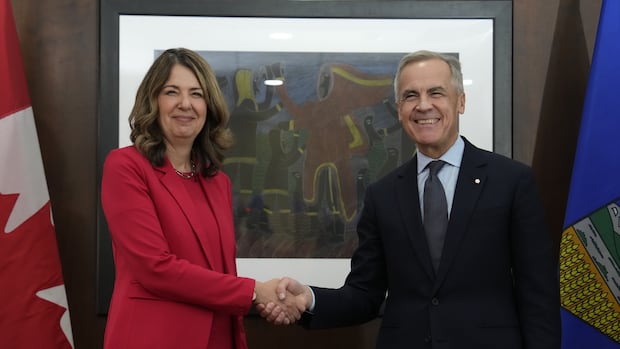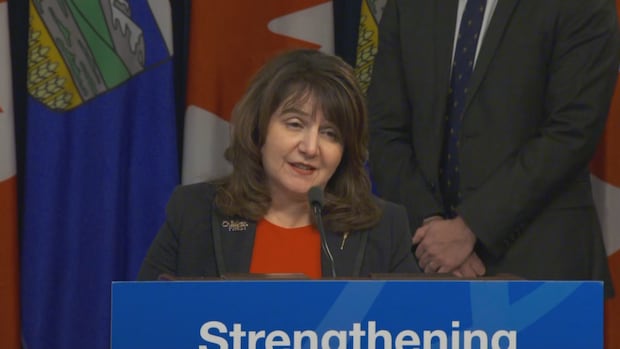Listen to this article
Estimated 5 minutes
The audio version of this article is generated by text-to-speech, a technology based on artificial intelligence.
Prime Minister Mark Carney and Alberta Premier Danielle Smith have agreed to the broad outlines of a memorandum of understanding that would give Alberta special exemptions from federal environmental laws and offer political support to a new oil pipeline to the B.C. coast, CBC News has learned.
The deal is set to be formally announced at a joint Carney-Smith news conference in Calgary on Thursday.
It would be contingent on Alberta embracing a stricter industrial carbon pricing regime and a multibillion-dollar investment in carbon capture from the Pathways Alliance of oilsands companies, according to sources who spoke to CBC News.
CBC News spoke with multiple sources with knowledge of the plan or who had been briefed on it, but were not authorized to speak publicly before the memorandum of understanding (MOU) is released.
The historic agreement could reset the relationship between the two levels of government, which have been at odds with each other for some time. The announcement is expected to come with a major public relations push, including an event involving the Calgary Chamber of Commerce, the prime minister, the province’s premier and other Albertan politicians.
The deal is expected to include carve-outs for Alberta on federal greenhouse gas regulations that it has long opposed, including Ottawa’s net-zero clean electricity regulations. The deal would see Ottawa suspend those regulations if Alberta agrees to strengthen its industrial carbon price.
Placing an effective carbon price on large emitters, such as the oil and gas industry, is widely acknowledged among climate policy experts as one of the most effective tools to reduce harmful emissions.
All of this could make the federal government’s proposed oil and gas emissions cap unnecessary, paving the way for its removal. The Carney government argued the cap would be obsolete if those conditions were met when it outlined its Climate Competitiveness Strategy in the 2025 budget.
The budget also announced the federal government will tweak rules in the Competition Act that crack down on companies engaging in misleading advertising on environmental claims, what’s known as greenwashing.
The Alberta government and industry groups have called for a repeal of those laws.
WATCH | Concerns over lifting tanker ban:A potential new oil pipeline from Alberta to B.C. is shedding light on the dangerous B.C. waters that tankers would have to navigate if it's built. CBC's Janella Hamilton dives into the implications and the worries.Thursday’s agreement is expected to contain language around the need for Alberta to negotiate with the B.C. government as it advances work on a pipeline to ship oil to the northwest coast.
CBC News and others have already reported that the energy accord is expected to contain wording on a path forward on an Alberta to northwest B.C. oil pipeline and exemptions to a ban on oil tankers from the northern tip of Vancouver Island to the Alaska border.
The MOU is also expected to include language around the need for Indigenous ownership and equity, along with the need for tripartite engagement with B.C.
B.C. Premier David Eby told reporters that he spoke with the prime minister on Monday morning, who told him the details were not finalized.
Adrian Dix, B.C.'s energy and climate solutions minister, suggested that Thursday's agreement is focused on a speculative pipeline without a settled route or confirmed buyers.
"The reason this is an MOU … is there ain't no project here," Dix told reporters.
He also pointed out that Smith is set to face her party's membership at a United Conservative Party convention in Edmonton this weekend.
"Timing is a priority for Alberta because, apparently, there is a political convention this weekend. And apparently Alberta needs to unite the right."
Appearing before a parliamentary committee on Monday, Natural Resources Minister Tim Hodgson was asked whether the government would create an exemption to the tanker ban.
"We have been clear with proponents. If they have support of First Nations and jurisdictions, we will work with them to clear whatever barriers there are," he said.
The Alberta government wouldn't elaborate on the details shared with CBC News.
"We hope to have more to share in the coming days," said Sam Blackett, a spokesperson for the Alberta premier.
The agreement will also include an emphasis on getting the $16.5-billion Pathways Alliance carbon capture and storage project done.
The proposal by the consortium of oilsands companies would involve trapping greenhouse gas emissions from facilities in northern Alberta and transporting them by pipeline to an underground storage hub near Cold Lake, Alta.
The early details of the MOU amount to a "historic betrayal of Canada's climate commitments and Indigenous rights," said Keith Stewart, senior energy strategist with Greenpeace Canada.
"The carbon pollution from expanding oil production to fill a massive, new pipeline will overwhelm any potential reductions involved."











